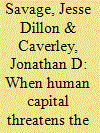| Srl | Item |
| 1 |
ID:
152417


|
|
|
|
|
| Summary/Abstract |
Countries interested in the promotion of political development often provide aid in the form of democracy assistance. However, some regimes resist these attempts to promote democracy, introducing repressive measures to counteract their effectiveness. Hence, democracy assistance sometimes has the unintended consequence of curtailing democracy. This article explains how the size of the targeted regime’s military determines the effectiveness of democracy assistance and why it can sometimes result in lower levels of political freedom. Large militaries, often holding a privileged position in authoritarian regimes, will be threatened by political liberalization and its associated redistribution of resources. They will thus work with the regime to limit the effect of democracy assistance, while their size makes this repression more feasible. In states with smaller militaries, regimes have less incentive and capacity for repression, and democracy assistance is more successful at empowering democratic opposition. Cross-national statistical analysis of the United States Agency for International Development democracy assistance supports the argument.
|
|
|
|
|
|
|
|
|
|
|
|
|
|
|
|
| 2 |
ID:
105945


|
|
|
|
|
| Publication |
2011.
|
| Summary/Abstract |
Most theories of empire and international hierarchy have implicitly or explicitly posited disparities of power between the core and the periphery as a sufficient condition for the stability of imperial arrangements. While power is a necessary condition, it is not sufficient. Peripheral actors can resist despite power disparities, and such resistance can destabilize imperial institutions. Given this fact, the preferences and beliefs that motivate peripheral actors to seek either accommodation or to resist are of central importance for explaining empire and hierarchy. These preferences can be explained by analyzingthe complementarities between the imperial order and domestic political institutions in the periphery. This will be demonstrated through comparison of European informal empire in China, the Ottoman Empire and Egypt.
|
|
|
|
|
|
|
|
|
|
|
|
|
|
|
|
| 3 |
ID:
154848


|
|
|
|
|
| Summary/Abstract |
How does aid in the form of training influence foreign militaries’ relationship to domestic politics? The United States has trained tens of thousands of officers in foreign militaries with the goals of increasing its security and instilling respect for human rights, democracy, and civilian control. We argue that training increases the military’s power relative to the regime in a way that other forms of military assistance do not. While other forms of military assistance are somewhat fungible, allowing the regime to shift resources towards coup-proofing, human capital is a resource vested solely in the military. Training thus alters the balance of power between the military and the regime resulting in greater coup propensity. Using data from 189 countries from 1970 to 2009 we show that greater numbers of military officers trained by the US International Military Education and Training (IMET) and Countering Terrorism Fellowship (CTFP) programs increases the probability of a military coup.
|
|
|
|
|
|
|
|
|
|
|
|
|
|
|
|